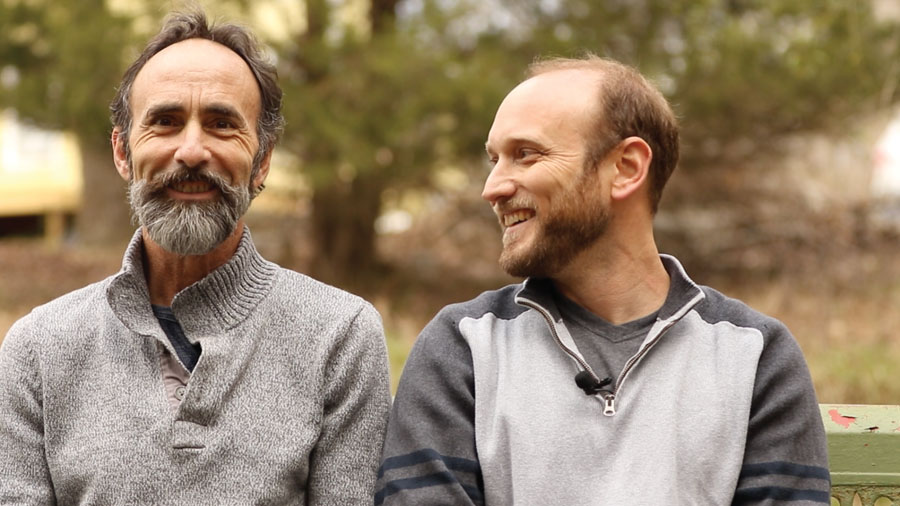In Columbia, N.C., there lived a man who knew the endangered red wolves perhaps better than anyone. Red wolf federal biologist Chris Lucash had worked to reintroduce endangered red wolves into the wild since 1986, when zero existed outside of captivity. With the help of Lucash and his colleagues, that number peaked at an estimated 130 individuals; however, the population has declined drastically in recent years. Today, an estimated 45-60 wild red wolves remain, and the entire program—like the animal itself—faces possible extinction.
As he watched the debate of the endangered red wolves’ existence in the wild unfold in recent years, Lucash soon faced another battle: his own mortality.
In June of 2015, Lucash, at the age of 53, was diagnosed with ALS. The next day, the documentary Staring Down Fate was born, a parallel examination by filmmaker Jeff Mittelstadt of Lucash, as he battled his rapid physical decline, and the red wolf program, as supporters fought for its survival.
Mittelstadt first met Lucash in April of 2011. A novice filmmaker, Mittelstadt was finishing work for his master’s degree in journalism and mass communication from UNC-Chapel Hill while also founding a non-profit, WildSides. Mittelstadt’s interest in human-wildlife conflict led him to the endangered red wolves, the original intended subject for his project. And that, in turn, led him to Lucash.
“I did not intend on doing a feature- length documentary,” Mittelstadt
said. “My purpose was to create an educational and documentary interactive multimedia website that would provide depth into the red wolf issue….The whole purpose was to figure out ways to rise above a conflict by finding similarities among people on different sides of the conflict issue.”
Mittelstadt had asked Lucash if he could shadow him as the latter worked with the red wolves. The young filmmaker arrived early one morning and stepped out of his car to introduce himself. “I put out my hand, and I was all excited, because we were going
to look for red wolf pups,” Mittelstadt remembered on an episode of WUNC’s The State of Things. “And Chris just looked at me and said, ‘You know, we’ve never invited a film crew back.’ And they turned around and walked into the woods.”
Though he was intimidated, Mittelstadt followed—and trekked with the team through the woods for seven hours. As the day ended, Lucash told Mittelstadt: ‘Come back whenever you want.’ Mittelstadt returned the next weekend and spent 16 hours with Lucash. “Not long after that, I felt like I’d known him forever,” Mittelstadt said. That feeling was echoed by many whom Mittelstadt spoke to, friends and colleagues who expressed a dual understanding of Lucash as a hardened biologist as well as a good friend with a big heart and an unconditional love for nature.
Lucash lived in a house with a fertile yard and garden space with his wife, Alisa Esposito, and their three children: Amie, Noah and Eden. About 5’11”, strong and fit, Lucash loved the physicality of his fieldwork; however, as Mittelstadt continued to shadow him throughout 2011 and 2012, Lucash began to complain of back pain.
By the end of 2014, Lucash often found himself exhausted and in near constant pain. He had a noticeable foot drop and his voice was getting softer. The issue of the red wolves had become more contested politically, and Lucash continued to advocate for their existence in the wild.
In early June of 2015, after seeing several doctors and specialists, Lucash received his devastating diagnosis: ALS. He texted Mittelstadt the next day, asking the filmmaker to tell his story. Mittelstadt knew right away what his answer would be—“but I had to think of a lot of things in terms of quitting my paying job, and how my life would change at that point,” Mittelstadt said. “My first reaction was sadness [for Chris and his family]. I cried and I was angry, and then it was weird—a strange feeling because it was mixed with honor to
be asked, and that fed back into the sadness even more again.”
Mittelstadt put his red wolves interactive project—which he’d worked on for the previous four years, filming stakeholders from all sides of the issue—on hold, realizing that given Lucash’s terminal illness, time was a key factor. He began filming with Lucash, his family, his colleagues and ALS experts, showing not only Lucash’s physical decline, but also exploring possible environmental factors correlating with Lucash’s diagnosis.
The result—Staring Down Fate—is a raw, intimate portrait of Lucash, interwoven with the story of the endangered red wolves. Lucash passed away on June 4, 2016, less than a year after his initial diagnosis, and the film beautifully chronicles his final year of life.
Mittelstadt continued to work on the lm after Lucash died, sifting through over 400 hours of footage, logging, scripting and editing until June of 2017. Once he’d finished, Mittelstadt entered the documentary, which is slated for public release in January or February, into several film festivals. Staring Down Fate was voted Best Feature Film at the Sunrise 45 Film Festival in Michigan this past summer and received an honorable mention award for feature documentary at the 2017 Southern City Film Festival. Mittelstadt plans to screen the documentary on campuses and in communities beginning in mid-January.
Alisa and her three children now live in Pittsboro, N.C., where she runs Sparkroot Farm, a farm focused on connecting people back to the environment and nature.
“I want people to realize that we need to learn and research more about the potential environmental correlations with ALS and other neurodegenerative diseases, because if only 10-15% of ALS cases are purely genetic, there’s a potential ability to keep people from getting ALS in the future,” Mittelstadt says of the film. “From the wildlife conservation side, I want everybody to see Chris and his dedication to another species—which is pretty selfess in and of itself—and think about, how do we want to live our lives with nature, with wildlife and with purpose, so that we can become less afraid of dying the way he did …and to try and make the world a better place.”








